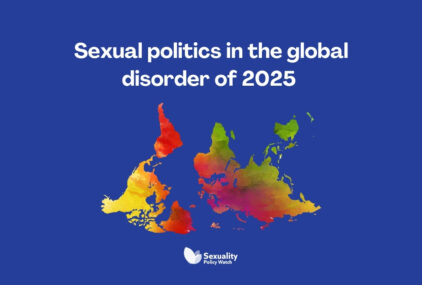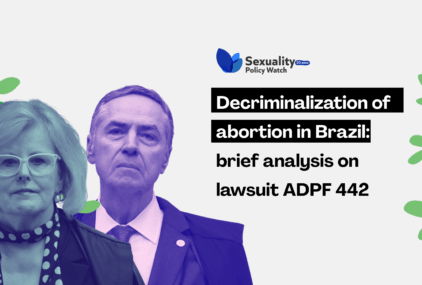Sexual politics in the global disorder of 2025
This is our second and latest bulletin of 2025. It offers a broad overview of events and trends in gender, sexuality, and abortion policy throughout the year to complement the analysis developed in July that addressed the policies implemented by the Trump’s second administration and the US landscape.
Global Gag Rule expanded by Trump’s administration: explanatory summary
On January 22, Trump’s administrarion announced it was suspending the funding for foreign organizations that promote diversity, equity, and inclusion initiatives. SPW summarized the main changes, which expand the restrictions set by the Mexico City Policy and will have many ramifications. Check it out below:
Transsexuality in the eyes of Genspect
Genspect was founded in 2021 by Irish psychotherapist Stella O’Malley. As will become clear later, it is based on a conservative ideology. Insidiously, it disrespects the transgender community and undermines their rights—namely, the right to undergo medically assisted gender transition—which is in clear dissonance with the current values of integration and acceptance of this group.
The Spanish Far Right On The Global Stage: Opposition To Sexual And Reproductive Rights
L’Associació de Drets Sexuals i Reproductius, an organization that works directly with young people and women at the community level to defend their sexual and
VIDEOS: Inhabiting the Crack: strategies of resistance in the face of authoritarianisms
The Diálogos Pendientes y Emergentes (Pending and Emerging Dialogues) space is a joint initiative of five organizations working on gender, sexuality, and reproductive justice issues in Latin America: the Sexuality and Politics Watch (SPW), Akahatá, Promsex, Puentes, and Synergia.
“Blurred Boundaries” maps the ecosystem of essentialist feminisms and their relationship with the anti-gender field
The Sexuality Policy Watch (SPW), the Center for LGBT+ Human Rights and Citizenship at the Federal University of Minas Gerais (NUH/UFMG), and the National Association of Travestis and Transsexuals (ANTRA) have released the research report “Blurred Boundaries: Feminist and Women’s Movements and Anti-Gender Politics in Brazil,” which is also supported by Ação Educativa, Cladem Brasil, Criola, Ipas Brasil, and the Nem Presa Nem Morta campaign.
Decriminalization of abortion in Brazil: brief analysis on lawsuit ADPF 442
The politics of abortion rights in Brazil entered a new chapter in October. Before his voluntary retirement, the last act of Federal Supreme Court (STF) Justice Luís Roberto Barroso was to cast a vote in favor of lawsuit ADPF 442, which seeks to decriminalize abortion up to the 12th week of pregnancy.
The new world disorder – Meanings and impacts of Trump 2.0 – condensed vídeos
On June 17th, SPW hosted, as part of the Pending and Emerging Dialogues project, the debate The new world disorder: meanings and impacts of Trump 2.0, with the participation of Heidi Beirich (GPAHE – focus on Project 2025) and Paisley Currah (Professor of Gender and Women’s Studies, expert on trans rights).
The power of anti-gender politics and its effects on human rights
by Sonia Corrêa [1] Anti-gender politics: Why the name and how to define it today? In September 2025, there is little doubt that the relentless
Éric Fassin on the specter of a new McCarthyism: “Democracy is collapsing like a house of cards”
Question: Two weeks ago, we witnessed a new and fierce attack on academic freedom in the United States. The University of Berkeley that is considered










